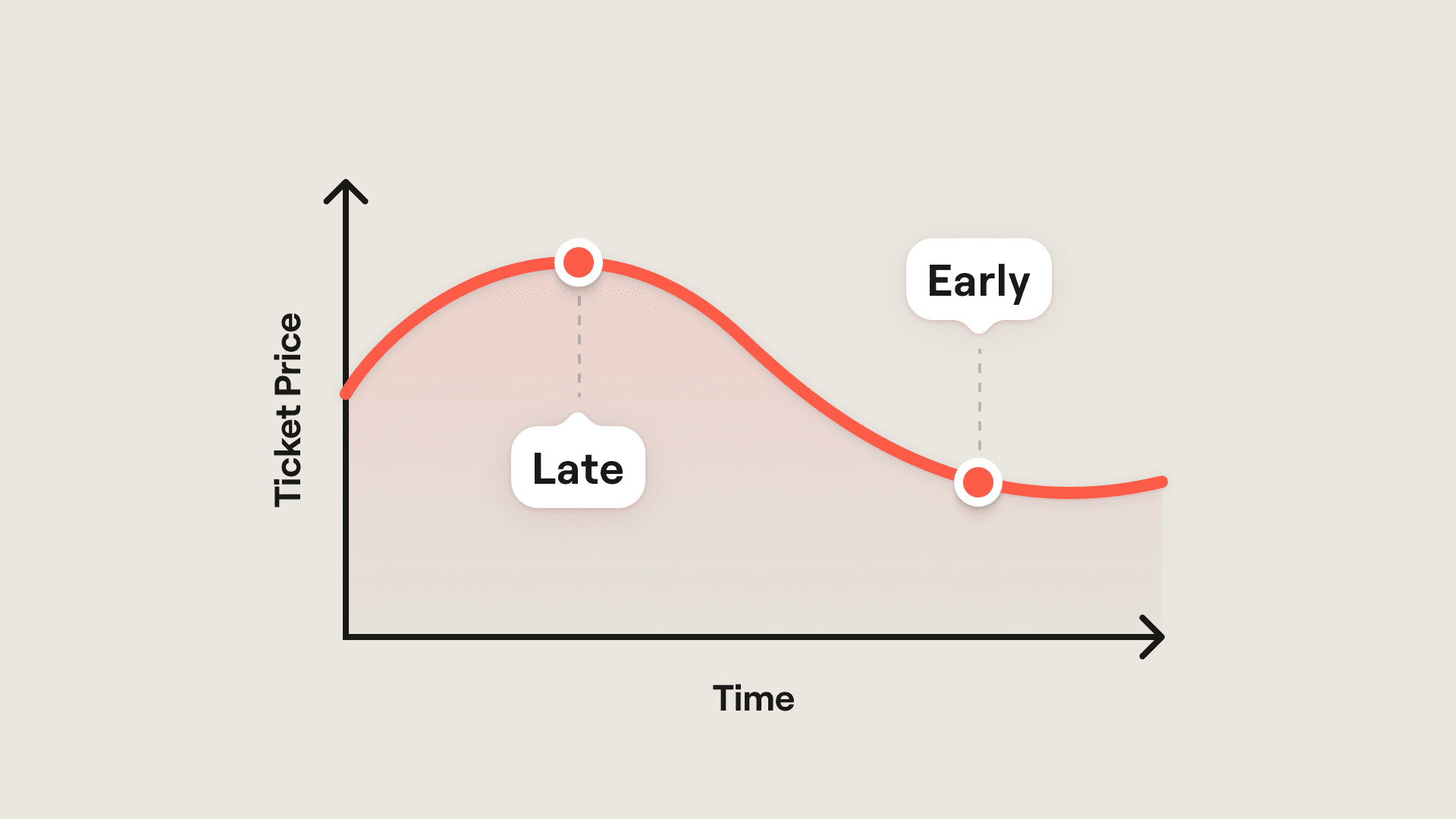Aug 7, 2025
·Emily Kho

We’ve all had the same dilemma—see a great event, check ticket prices, and think, “Should I buy now or wait a little longer?”
Whether it’s a New York Yankees game, a Beyoncé concert at SoFi Stadium or Hamilton on Broadway, timing can mean the difference between a great deal and serious sticker shock.
Ticket prices don’t follow a single rule—they shift based on supply, demand, day of the week and how close you are to the event. But there are patterns, and if you know what to look for, you can consistently score better seats for less.
Here’s how the ticket pricing lifecycle works, plus insider tips from SeatGeek’s pricing trends and historical data to help you time your purchase perfectly.
Why Timing Matters for Ticket Prices
Ticket prices are dynamic. They fluctuate as inventory is released, demand spikes or dips, and resellers adjust their listings. Unlike retail shopping, waiting for a “sale” doesn’t always guarantee savings—but knowing the general flow of how ticket prices behave does.
Here’s the basic truth: tickets are rarely cheapest the moment they go on sale, and prices often drop closer to the event—but not always.
Let’s dive into how this plays out.
The Ticket Pricing Lifecycle: Early vs. Late Buying
When events are first announced, many fans rush to buy tickets right away. This initial surge can lead to inflated prices on resale platforms—especially for high-demand events like Taylor Swift’s Eras Tour or the NBA Playoffs.
But what many buyers don’t realize is that:
Prices often dip a few weeks after the initial sale, once the hype settles and resellers start adjusting based on actual demand.
In the final 7–10 days before an event, prices can fall even more—especially for events that didn’t sell out.
This pattern is especially true for regular-season sports games and mid-tier concerts.
For example:
NFL tickets for Jets vs. Dolphins at MetLife Stadium averaged $160 at initial release but dropped to $110 just five days before kickoff in the 2023 season.
Harry Styles at Madison Square Garden saw floor tickets dip by over 30% two weeks before his final show—after peaking in the first week of sales.
The exception? Extremely high-demand or once-in-a-lifetime shows (think: U2 at Sphere in Las Vegas, Super Bowl or the Tony Awards). For these, prices may only go up, especially once official inventory sells out.
Weekday vs. Weekend Events: What the Data Says
When it comes to live events, the day of the week matters—both in pricing and in how tickets move.
Weekday events (Mon–Thurs) tend to have lower average ticket prices due to work and school schedules, even for popular artists. A Wednesday night Lizzo show in Chicago might cost 25% less than her Saturday performance in the same city.
Weekend events (Fri–Sun) draw more demand and usually maintain higher prices, especially for concerts and theater shows. Broadway ticket prices for The Lion King or Wicked can jump $50–$100 between Wednesday and Saturday shows.
If your schedule is flexible, opt for mid-week performances for the same entertainment—at a better price.
Sports vs. Concerts vs. Theater: How Event Type Affects Pricing
Different events follow different pricing curves.
Here's how timing tends to break down by category:
Sports (NFL, NBA, MLB, NHL)
Buy late: Prices often drop closer to game day unless it’s a rivalry or playoff game.
For example, LA Clippers tickets at Crypto.com Arena frequently dip 24–48 hours before tip-off unless they’re playing a major team like the Lakers or Warriors.
Concerts
Buy mid-range: Wait 3–6 weeks after tickets go on sale, then compare.
Artists like Drake or Olivia Rodrigo see prices settle once the initial rush fades. Some drops can be substantial unless demand remains consistently high.
Theater (Broadway, Touring Shows)
Buy early or mid-week: Popular shows like Hamilton or Moulin Rouge! may never drop in price for weekend performances.
Mid-week performances at venues like the Orpheum Theatre in San Francisco or Chicago’s CIBC Theatre tend to be more affordable and easier to score at the last minute.
How SeatGeek’s Pricing Trends Help You Decide
SeatGeek doesn’t just sell tickets—it helps you buy smarter.
Our platform tracks millions of listings and historical data points, giving you tools to time your purchase:
Deal Score®: Ranks each ticket based on value—so you’re not just looking at price, but what you’re getting for it. A $120 ticket with a 90 Deal Score might be a better seat and better value than a $95 ticket in the nosebleeds.
Price Trends & History: For many events, SeatGeek displays whether prices are trending up or down, and how that compares to past events at the same venue.
Notifications & Price Alerts: Set alerts for specific events (like Post Malone at Fenway Park) and get notified when tickets dip into your ideal range.
These features take the guesswork out of timing and let you focus on the experience, not the stress of “did I overpay?”
Final Thoughts
There’s no universal rule for when to buy tickets—but with the right tools and a bit of strategy, you can save big and still get incredible seats.
Whether you're heading to a Knicks game at Madison Square Garden, an Elton John farewell concert or a touring Broadway show, your timing can be just as important as your seat selection.
Use SeatGeek’s pricing insights, Deal Score, and real-time seat views to make confident, informed decisions. Because when it comes to live events, great memories start with a smart ticket buy.